When you’re cradling a newborn at 3am, the idea of boarding a plane or packing suitcases feels laughably ambitious. Yet here’s something that often surprises new parents: those first few months, before your baby becomes mobile, might actually be the golden window for family travel.
It seems counterintuitive, doesn’t it? But consider this: your baby’s world is delightfully simple right now. They need milk, sleep, clean nappies, and cuddles – none of which require a specific postcode. They won’t remember the holiday, but you’ll treasure the change of scenery, the shared experience with your partner, and the confidence that comes from proving you can still embrace adventure as a family.
That said, travelling with a baby requires a different approach to the spontaneous getaways of your pre-parent life. With thoughtful preparation and realistic expectations, you can create a genuinely restorative break. Here’s how to make it work.
Prioritise Space Over Luxury In Your Accommodation
The allure of a boutique hotel quickly fades when you’re attempting to sterilise bottles in a bathroom sink whilst your partner tries to soothe a crying baby three feet away. Self-catering apartments or holiday cottages offer something far more valuable than Egyptian cotton sheets: space to breathe.
Look for accommodation with separate sleeping areas so that once your baby settles for the night, you’re not condemned to sitting in darkness. A kitchen becomes essential, not just for washing and sterilising, but for the freedom to prepare simple meals when your baby’s schedule doesn’t align with restaurant hours. In-house laundry facilities mean you can pack lighter and handle the inevitable explosions without panic.
Consider ground-floor accommodation if possible, eliminating the stress of navigating stairs with a pram, and ensuring you won’t disturb neighbours during 4am pacing sessions.
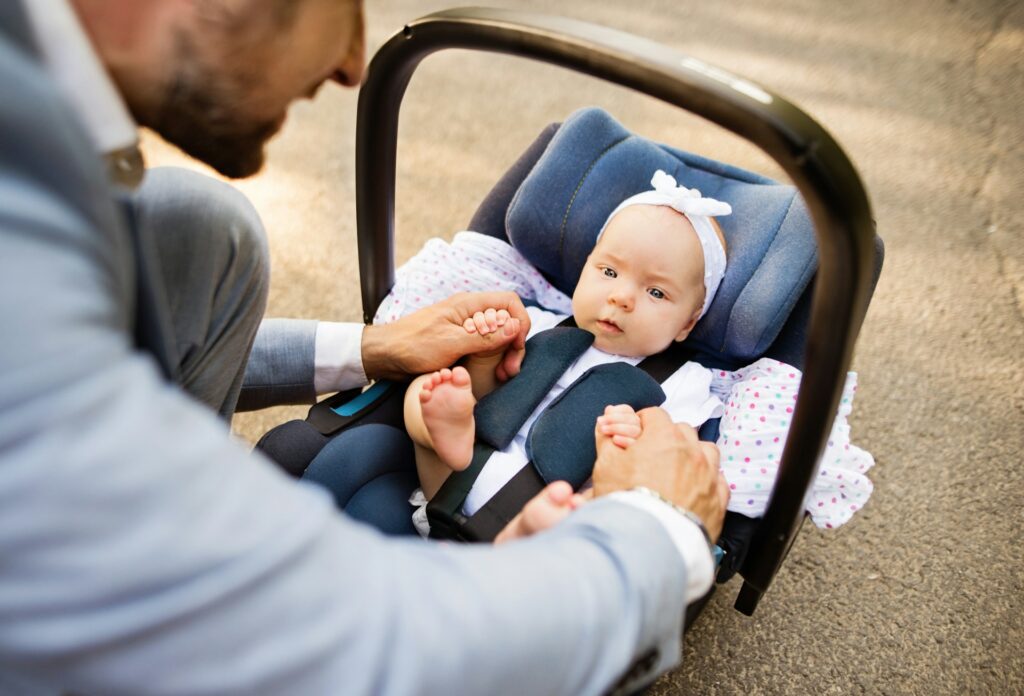
Think Carefully About Your Destination Choice
Some destinations are inherently more forgiving for families with babies than others. Prioritise places with reliable healthcare facilities, especially if you’re travelling with a very young infant. Countries with excellent hygiene standards reduce anxiety about sterilisation and food preparation.
Consider time zones carefully. Jet lag is manageable when you’re only dealing with your own sleep deprivation, but becomes exponentially more challenging when combined with a baby’s disrupted schedule. For your first family holiday, destinations within a couple of hours’ time difference are worth considering.
Climate matters too. Extreme heat poses genuine challenges for babies under six months, who can’t regulate their temperature effectively and shouldn’t wear sunscreen. Mild, temperate destinations often prove more practical than tropical beach resorts, though with proper planning, most locations are feasible.
Schedule Flights Around Your Baby’s Natural Rhythms
The cheapest flight time rarely coincides with the easiest travel experience. Study your baby’s daily patterns over several weeks before booking. Does your little one have a predictable calm period mid-morning? Or perhaps they settle well in the early evening? Book flights that align with these windows when possible.
Consider flight duration carefully. Direct flights, even if pricier, eliminate the stress of navigating connections with all your baby gear. However, very long direct flights (over six hours) can be equally challenging. Sometimes a shorter journey with one manageable connection provides better breathing space than an eight-hour marathon.
Contact the airline after booking to request a bulkhead seat with bassinet. These aren’t always available and can’t be guaranteed, but they’re worth pursuing. Arrive at the airport with generous time margins – rushing amplifies stress exponentially when you’re managing both luggage and a baby.
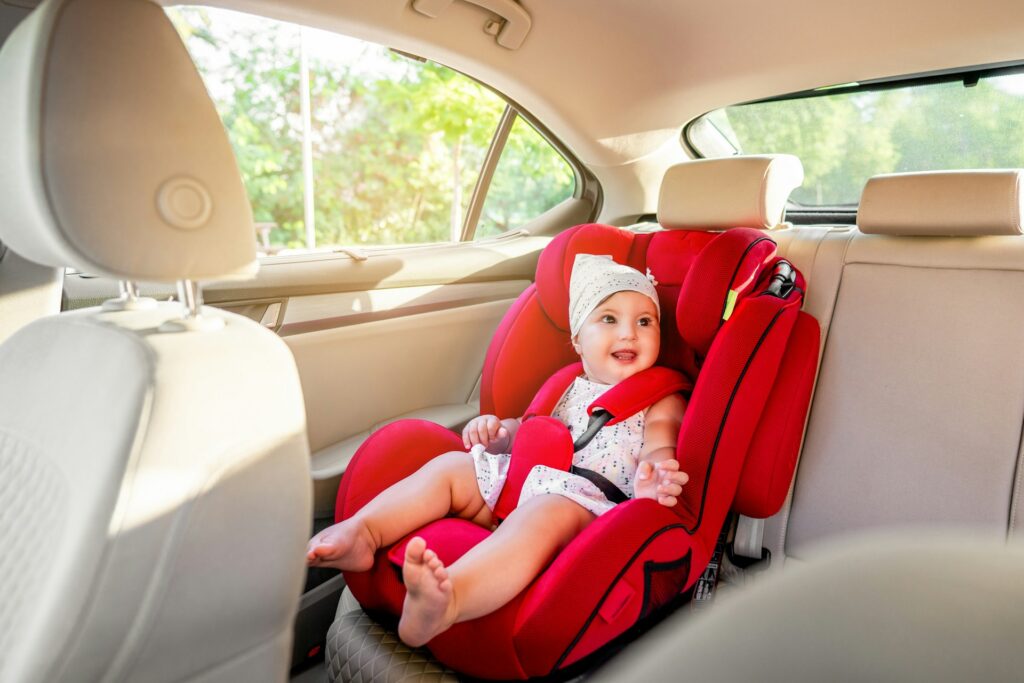
Master The Art Of Strategic Packing
Overpacking is a rookie error, but so is underpacking essentials. The key to successful packing when travelling with a baby lies in distinguishing between what you genuinely need and what’s available anywhere in the world. Nappies and wipes? You’ll find them in virtually every country. Your baby’s specific brand of hypoallergenic formula that took you weeks to find? That comes with you.
For your hand luggage, pack as if you’re preparing for minor catastrophes. Three outfit changes for your baby (vests, sleepsuits, the works), two spare tops for yourself, double the nappies you think you’ll need, and individually portioned formula sachets if you’re not breastfeeding. Include muslins, bibs, a change of clothes packed in separate sealed bags. This way, when disaster strikes, you’re pulling out a complete outfit rather than rummaging through everything.
Dress your baby in comfortable layers. Aeroplane temperatures are notoriously unpredictable, swinging between sauna and icebox seemingly at random. Bring a lightweight blanket regardless of your destination’s climate.
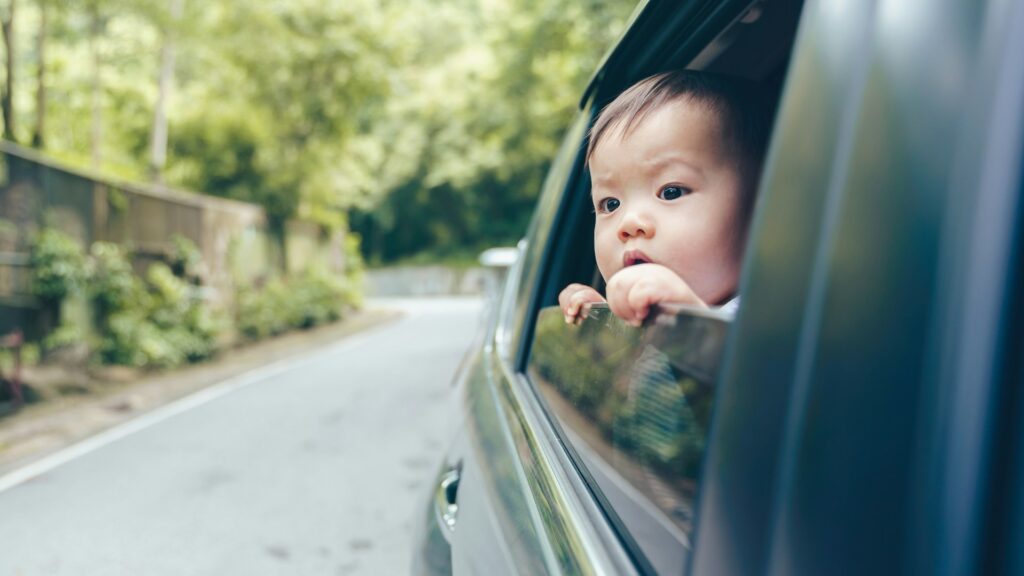
Understand Your Rights & Airlines’ Baby Policies
Policies vary significantly between airlines and it’s worth researching thoroughly. Most allow prams to be taken to the aircraft door, but some require them to be checked at the desk. Some airlines provide nappies and wipes; others offer nothing. Certain carriers permit bassinets only on specific aircraft types.
Know what baby equipment counts as your luggage allowance and what travels free. Many airlines allow a pram and car seat at no extra charge, but budget carriers may have different rules. Understanding these details prevents expensive surprises at check-in.
Similarly, research infant ticket costs. On some airlines, babies under two travel free domestically but incur a charge internationally. This can significantly impact your budget, particularly if you’re considering multiple trips during your child’s first years.
Maintain Feeding Flexibility
Whether you’re breastfeeding or bottle-feeding, having a clear plan reduces stress. If you’re breastfeeding, practise nursing in various positions and locations before your trip; confidence helps enormously when you’re feeding in unfamiliar settings.
For bottle-fed babies, pre-measured formula portions and ready-to-feed bottles are invaluable during travel, despite the higher cost. Once at your destination, research where to buy your preferred formula brand, or bring enough for your entire stay if it’s specific or hard to source.
Bring sterilising tablets or a compact microwave steriliser if your accommodation doesn’t provide equipment. Many parents swear by cold-water sterilisation when travelling – it’s simple, reliable, and doesn’t require special equipment beyond a large container.
Plan A Realistic Daily Rhythm
Forget your pre-baby travel style of museum-hopping from dawn until dinner. With a baby, success looks different: perhaps a morning at a local market, followed by lunch at your accommodation during nap time, then an evening stroll along the seafront.
Build your days around your baby’s schedule rather than forcing them into yours. If your little one naps predictably after lunch, that’s not the time to book a three-hour guided tour. Instead, use that period for downtime; read, nap, or simply enjoy sitting somewhere beautiful without rushing.
Accept that some days, you might not leave your accommodation at all. If your baby’s particularly unsettled, or you’re all exhausted, a “lazy day” isn’t a wasted day, it’s exactly what holidays should provide.
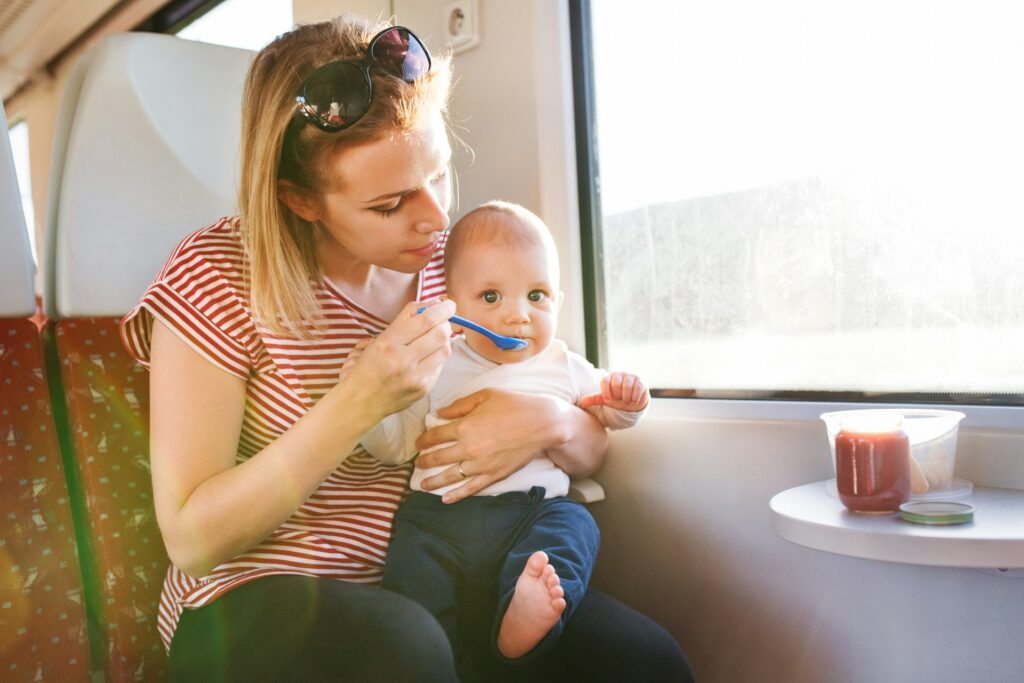
Create A Portable Sleep Environment
Sleep challenges multiply in unfamiliar environments. Babies are remarkably sensitive to changes in sound, light, temperature, and routine. Your job is to recreate familiar elements wherever possible.
If your baby uses white noise at home, download several apps or bring a dedicated device; they’re remarkably effective at masking unfamiliar sounds. Gentle sounds to help babies sleep can make an enormous difference in new environments. Blackout blinds rarely exist in holiday accommodation, so pack a portable blackout blind or large black bin bags and masking tape (genuinely effective, if inelegant).
Bring your baby’s usual sleeping bag, familiar-smelling cot sheets, or whatever they associate with sleep. These sensory cues help signal bedtime despite the strange surroundings. Maintain your usual bedtime routine as closely as possible – the same songs, the same sequence of events, the same comforting rituals.
Prepare For Health Scenarios
Nothing dampens holiday joy quite like a sick baby. Before travelling, locate the nearest medical facilities to your accommodation and save their contact details. Understand how your travel insurance covers your baby and keep policy details easily accessible.
Pack a baby first-aid kit containing infant paracetamol or ibuprofen (appropriate for your baby’s age), a thermometer, saline nasal drops, teething gel if relevant, any prescription medications, and a small supply of rehydration sachets. Include plasters and antiseptic cream for yourself too – parental injuries happen.
If you’re travelling internationally, research required or recommended vaccinations at least two months before departure. Some immunisations aren’t suitable for very young babies, which might influence your destination choice.
Keep your baby’s red book (personal child health record) with you, along with photos on your phone of their vaccination history and any medical conditions or allergies.
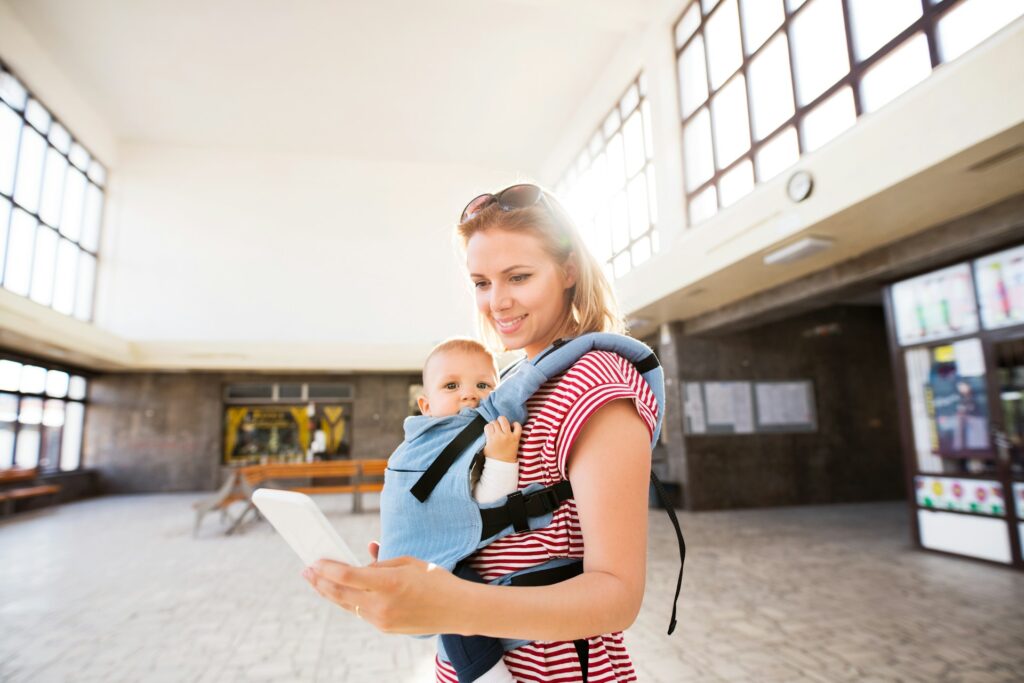
Recalibrate Your Definition Of Success
This final tip might be the most important: your holiday won’t resemble your pre-baby travels, and that’s perfectly fine. Success isn’t measured by attractions visited or meals eaten out. It’s measured by moments; your baby’s first experience of the sea, an unrushed breakfast together, the pleasure of reading a book whilst your partner handles the morning routine.
There will be challenges. Your baby might sleep poorly, feeds might become complicated, you might spend an entire day dealing with a stomach upset. These frustrations are real, but they’re also temporary and manageable. The photographs you take won’t show the difficult moments, only the beautiful ones, and those are what you’ll remember.
Give yourself permission to change plans without guilt. The cathedral can wait. The famous beach will still be there. If your baby needs calm and routine, provide it. If they’re thriving and adaptable, embrace spontaneity. Every baby is different, every family is different, and every holiday will unfold in its own way.
Most importantly, be kind to yourselves as parents. You’re learning to navigate the world in an entirely new configuration. Mistakes will happen – forgotten items, poor scheduling decisions, moments of exasperation – but each experience builds your confidence for the next adventure.
The Bottom Line
These early months, when your baby is relatively immobile and portable, truly do represent a unique travel opportunity. In six months’ time, when your little one is crawling with determined speed towards every hazard, you’ll look back on this trip with new appreciation. In a few years, when you’re negotiating with a strong-willed toddler about wearing the souvenir clogs they demanded you bought, these baby days will seem blissfully simple.
So take the leap. Book the holiday. Make the memories. Your future self – the one chasing a energetic three-year-old through an airport – will be grateful you seized this particular moment.





